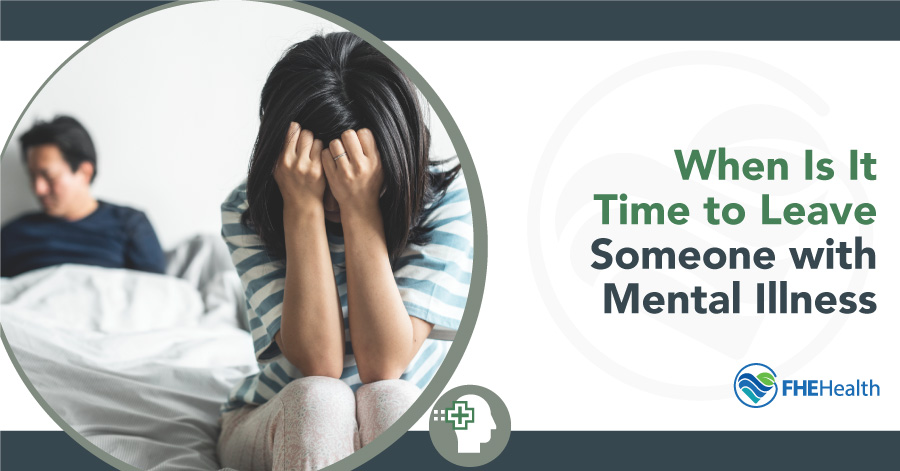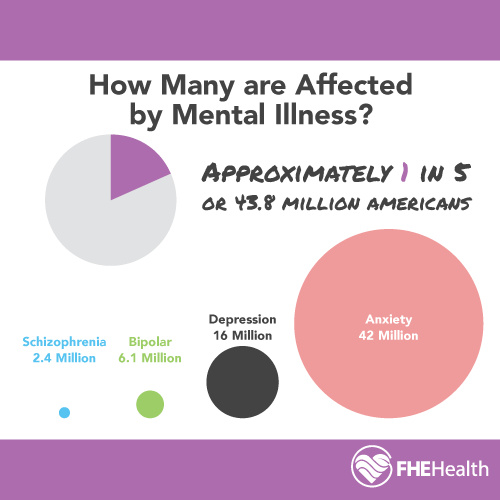
Maintaining a relationship with someone who has a mental illness requires a great deal of patience, understanding and a willingness to recognize that at times there may be more “give” than “take.” Making the decision to leave someone with a mental illness is difficult and is likely to be accompanied by feelings of guilt and confusion. However, in some cases, taking a step back from the relationship is necessary for the individual to take care of their own mental health.
Recognizing healthy boundaries and understanding roles and responsibilities in a relationship is always important, but it’s especially critical when one person has a mental illness.
Consider the Comparison with Drug Addiction
People who use illicit drugs sometimes force their loved ones to walk away. In these situations, staying in the relationship may result in enabling the individual to continue to use. Walking away gives the individual with the substance use disorder the opportunity to see how their addiction is impacting their lives and relationships and gives them the motivation they need to seek help.
Mental illnesses are complex, and unfortunately, the symptoms that make them so debilitating are often the same symptoms that prohibit the individual from getting the help they need. Depending on the condition, the individual may or may not get the push they need to seek professional help when they see the impact their mental illness has on their relationships.
While there may be reasons to walk away from a relationship with someone who has a mental illness, ending the relationship as a means of forcing them to hit rock-bottom and seek help may not be an effective strategy. Even so, walking away may be necessary for ending codependent behaviors and safeguarding mental, and sometimes physical, health.
Being in a Relationship with Someone with a Mental Illness

Early in a relationship, mental illnesses can be easy to hide. In some cases, the individual is high-functioning and can temporarily keep a tight rein on their symptoms, especially in the uncharted waters of a new relationship. The person they’re dating may not even realize that they have a mental illness, or they may not understand how that illness may affect the relationship over time.
For those who are considering leaving a mentally ill spouse, this type of relationship is the most difficult to navigate. Depending on their spouse’s mental illness, the individual may find themselves in a situation with physical, emotional or financial abuse. Loving someone may mean deciding to look past their mental illness, but unfortunately, that doesn’t mean the mental illness doesn’t have a profound effect on both spouses’ quality of life.
In these circumstances, it’s important for the individual to realize that they’re not responsible for their spouse’s mental illness. Ultimately, only that person is accountable for and has control over their own actions. Recognizing this can help bring clarity regarding the right decisions in continuing or ending the relationship.
Making the Decision to Leave the Relationship
Understandably, making the decision to leave someone who has a mental illness brings an immense amount of guilt. The individual doesn’t want to see their partner struggle, and there may even be a concern that the partner will fall into self-harm.
Mental illnesses are often treatable with experienced mental healthcare providers who utilize a variety of therapies to correct chemical imbalances in the brain, help establish new thinking patterns and build coping mechanisms. However, without seeking help and following a treatment plan, the person with the mental illness is unlikely to improve.
In some cases, the individual needs to recognize the toll that remaining in the relationship is taking on them and determine whether staying or leaving is the better option.
How to Know It Is Time to Leave
There’s no clear-cut answer regarding whether an individual who’s dealing with someone with a mental illness should stay in the relationship. There may be plenty of reasons to stay; however, fear of the relationship ending isn’t a valid reason and isn’t healthy for anyone involved.
Understanding All the Options
Leaving a spouse with a mental illness is a difficult and drastic measure. Before taking this step, the individual should consider whether they’ve done everything they can to give their partner the support they need to seek help.
Evaluate Your Own Mental Health
Mental illnesses can make it difficult for the individual to fulfill their obligations, including handling their share of household chores, being emotionally available, maintaining employment, and socializing with friends. These behaviors can put a tremendous strain on a relationship and impact their partner’s mental health as they begin to feel frustrated and disconnected.
In some cases, the partner without the mental illness may benefit from seeing a therapist who can help them analyze their own mental health and even identify codependent behaviors that may prevent their partner from seeking treatment.
The Role as a Partner, Not a Therapist
Effectively treating mental illness requires the experience and training of a mental healthcare professional who understands underlying factors, co-occurring disorders and treatment methods and philosophies. While someone can provide invaluable support for their partner, they’re not a therapist. Not only do they likely lack the necessary training for providing treatment, but they’re too close to their partner to provide objective help.
Attend Couples Counseling
Couples therapy is highly beneficial for any relationship, but it can be especially helpful when one spouse is living with a mental illness. The therapeutic setting gives both spouses the opportunity to express their thoughts and fears regarding the mental illness and its impact on their relationship, finances and friendships. Therapists who are trained to recognize and treat mental illnesses and help couples navigate challenges provide valuable insight into how both spouses can understand and meet one another’s needs.
Suggest Treatment Options
If the individual with the mental illness isn’t in treatment, then their spouse can be an important support person who encourages them to reach out to a mental health provider. If they are in treatment and it doesn’t seem to be effective, it’s a good time for a conversation about whether they’re following their treatment plan or if they feel like their mental health provider isn’t a good fit for their needs.
The symptoms of mental illnesses like depression, bipolar disorder or anxiety can make it very difficult for the individual to seek treatment. In many cases, the individual may not believe that therapy will help them, or they may lack the energy, courage or drive to take the first steps. In instances like these, their spouse can be an important source of support and encouragement.
While mental illness can feel isolating, the truth is that one in four families in the United States is dealing with some type of mental illness. Sometimes, recognizing that they’re not alone can give a spouse with a mental illness the prompt they need to get help.
Discuss the Impact
Mental illnesses take a profound toll, not only on the individual with the illness but also on those closest to them. Their spouse may experience sleep difficulties, or they may be living with constant stress that makes it difficult to handle other worries. Sometimes, having an open conversation about how the mental illness is affecting both people in the relationship can be eye-opening for the person who needs treatment.
Determine if an Intervention Is Best
A team that offers mental illness interventions can provide objective insight into what the next steps should be for the relationship. This conversation should include what day-to-day life looks like for the couple and if the individual is considering leaving their spouse with the mental illness. If the interventionist believes that professional treatment is necessary, they can help the individual arrange for help for their spouse.
Despite the interventions seen on television, there’s generally no need for large-scale family events where everyone talks about how their loved one’s illness affects them. A small meeting with the individual, their spouse and an interventionist is the best forum for discussing problems and options for treatment. How the conversation concludes can help the individual determine whether staying with their spouse or taking a step back from the relationship is the better course of action.
Facing the Guilt After Leaving
Ending a relationship is never easy, but leaving someone with a mental illness is especially difficult. The individual may feel guilty about not being able to help their spouse get the help they need or overcome their condition. They may feel guilt that they no longer want to stay in the relationship “for better or worse,” and they may also feel guilt when considering whether ending the relationship will make their loved one’s condition worse.
While pushing these feelings aside is much easier said than done, it’s important to remember that this type of guilt isn’t constructive. If the individual took every reasonable step to help their loved one get the help they need but their efforts were unsuccessful, and if they, with the help of a mental healthcare professional, decided that leaving is best, then it’s important for them to accept the situation and move forward.
When Is It Time to Walk Away?
In some cases, the decision to leave is obvious. If physical abuse is present to any degree, and especially if the individual fears for their own life or well-being or that of their children, it’s important to leave as soon as possible. Safety is the number one priority.
Other times, it may be necessary to leave when all other options are exhausted. If the spouse with the mental illness refuses to seek treatment despite understanding the toll the illness has taken on them and their family, recognizing that help is available, and having access to a licensed treatment center, then the individual may need to leave to protect their own mental health.
Deciding to take a step back from the relationship doesn’t mean giving up on someone with a mental illness; it simply means that the individual is honoring their own need for healthy boundaries. They may continue to provide their spouse with encouragement and resources to seek professional help.
Seeking Help for a Loved One at FHE Health
FHE Health specializes in treating mental illnesses and helping individuals pursue the best health outcomes possible. Contact our team today to speak to our counselors 24/7 about personalized treatment plans.









